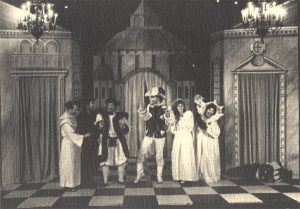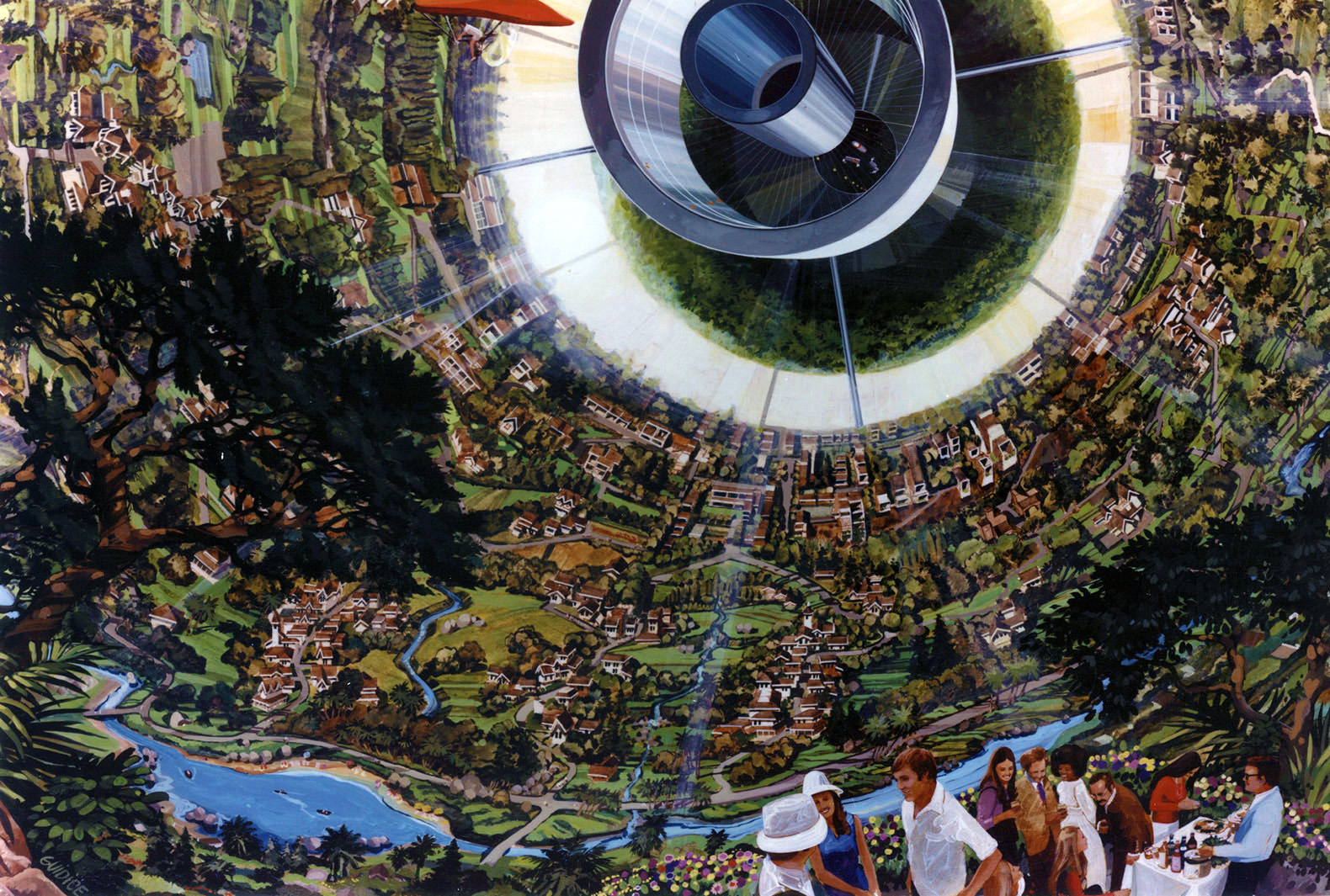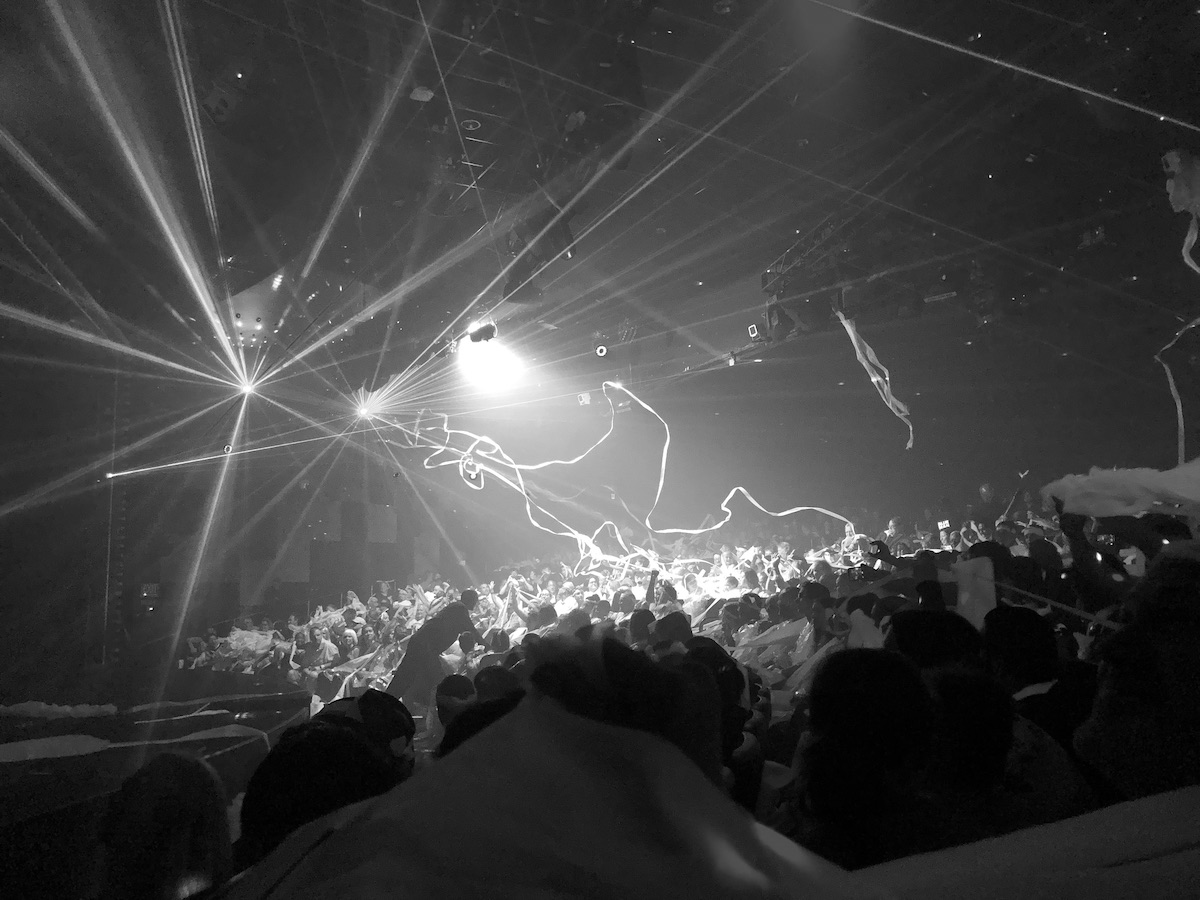The following is the last of a three-part series. The first part was published on May 31, 2016. The second part was published on June 17.
Carl Raschke and Force
Carl Raschke’s most recent book, Force of God, seeks to address tendencies toward de-historicizing by returning to an idea of force. He does so through a return to Nietzsche’s method of genealogy. Nietzsche’s work draws heavily on a critique of pre-Christian critiques of western civilization as far back as his Birth of Tragedy.
What contemporary readers often forget, however, is Nietzsche’s training in classics and philology. Although by the time he writes his Genealogy of Morals he is reacting to British empiricism, one cannot, even after his own self-critiques of his earlier work, forget that for him the foundation of rational civilization is indicative of the “twilight” of something better. Without this knowledge, people are likely to misunderstand Raschke’s Force of God.
Raschke is himself aware of potential misunderstanding when he warns at the outset of the book’s final chapter that what he is “about to say will probably shock and enrage many conventional readers, conditioned as we are to viewing guns and weaponry, particularly when mobilized for ‘military’ purposes, as instrumentalities of political reaction or unrestrained violence.”[1]
The reference to “conventional readers” indicates a broader audience in the author’s mind than one might associate with Columbia University Press, his publisher. As with any philosopher in Spinoza’s account of liberal society, Raschke risks misinterpretation while exercising the freedom to think about uncomfortable issues. In deciding how to read Raschke, one might look to Raschke’s inspiration in Friedrich Nietzsche’s On the Genealogy of Morals. Nietzsche explicitly warns his readers that the third essay in the book begins with an aphorism, and that inspires the exegesis itself – deciphering the aphorism.
Nietzsche then tells us: “To be sure, one thing is necessary above all if one is to practice reading as an art in this way, something that has been unlearned most thoroughly nowadays – and therefore it will be some time before my writings are ‘readable’ – something for which one has almost to be a cow and in any case not a ‘modern man’: rumination.”[2]
To the extent that Raschke’s book presents itself as a readable interpretation of Nietzsche, it also implies the current question: How are we to “chew cud” with Force of God? This question of rumination will be in necessary tension with how one interprets the insurrection Raschke calls for at the end of his text; it will also be a matter of, as Neitzsche coyly suggests, a matter of human-animal relationships. To be clear, Raschke does not self-identify as a liberal in this text, but I am reading him along with Kahn as potentially updating a view of liberalism more informed by continental and classical thinkers.
Raschke’s begins his book with an aphorism from Michel Foucault: Qui définit le moment où j’écris? (How to define the moment that I write?).[3] His book responds to a current exigence, but like Nietzsche, he believes it will it be a matter of time before what he is really saying is “readable.” Raschke’s critics may condemn such statements as evasions for being clear, but as Victoria Kahn’s account of Spinoza as a proto-liberal suggests, the freedom to philosophize is at the hear of liberal democratic society. Raschke is leaning on his freedom of speech, but the problem is lack of context in the globalized world.
The crisis of liberal democracy has less to do with violent assaults on its internal makeup from either domestic or foreign agents than what has been identified, although in entirely different contexts and sets of circumstances, by earlier political theorists as a “legitimation crisis.”
At the same time, such a legitimation crisis arises not from the failure of liberal institutions to “represent” the generic will or interests of their constituents but out of the impossibility of any conceivable politeia emerging from the complete evanescence of what we previously designated as the general equivalent for a global political economy. Any economy, in fact, is impossible without a general equivalent, whether it be gold or God.[4]
To go back the Heidegger’s reading of Aristotle, without politeia, we cannot understand the good or ethics. In Aristotle’s Rhetoric, ηθος (ethos) is understood as custom, manner, place, habit or dwelling. The current liberal crisis is a crisis of obliterated “self,” a self that cannot formulate an ethos from which to develop a “care for the self,” but it is due to exposure rather than due to becoming mindless drone in the fears of Orwell and Huxley. Raschke importantly distinguishes his theological project from religious enthusiasts who see the postsecular as an invitation to religion’s “return” or to a revival of some premodern Christianity.
The intimacy of political theory with what presently we have begun to denominate as political theology does not by any stretch of the imagination boil down to some revival of ancient or medieval arguments for theocracy. The theocratic suspicion, which is cloyingly common these days and polemically deployed way too often whenever religious claims or “faith statements” find a voice in the debates of liberal democracy, derives from a fatal misunderstanding of the very ontology of liberal democracy itself.[5]
Later in the book, after warning his readers of the forthcoming unpopular  opinions he will present, Raschke draws on Badiou and asserts that “the gun becomes the projective symbol of the empowered demos rather than of an antidemocratic lawlessness or of some sort of vicious reactionary, nativist, anticosmopolitan cabal.”[6] The apophasis here perhaps implies that not only is the gun the “projective symbol” of the demos but that the “empowered demos” is really a cosmopolitan one that transcends the nation-state.
opinions he will present, Raschke draws on Badiou and asserts that “the gun becomes the projective symbol of the empowered demos rather than of an antidemocratic lawlessness or of some sort of vicious reactionary, nativist, anticosmopolitan cabal.”[6] The apophasis here perhaps implies that not only is the gun the “projective symbol” of the demos but that the “empowered demos” is really a cosmopolitan one that transcends the nation-state.
Some traditional liberals may take issue with that formulation, but it works well with my earlier statement concerning Badiou and in actu. One of the most compelling parts of Raschke’s book comes a few pages earlier in an anthropological-historical claim as he sets up his political theology against a “bohemian bourgeoisie” that is terrified of revolution and religious enthusiasm: the automatic assumption within most contemporary politico-theological discourse of a certain summum bonum that might be described as a ‘Christian liberal state pacifism’ needs to be assertively challenged – not because it is false as a normative teleology of human societies, or that it must be zealously sought, but because it fatefully misreads history and human nature.[7]
The statement is not compelling for liberalism because, like Badiou, it attempts to activate a militant twenty-first century political theology of insurrection and resurrection – a “surge,” in which Raschke points out the shared cognate between the two words.
To Raschke’s “conventional readers” the call for an armed insurrection may sound a tune reminiscent of self-congratulatory, “right wing” evangelical Christianity or perhaps John Milbank’s radical orthodoxy. Yet Raschke is quick to qualify his thinking against such camps. He claims, “we live in an age ‘consecrated’ by the resurrection, the ultimate sign of the force of God. Tis event, let alone this force, we do not yet understand. Christian theology has no advantage, when it comes to such knowledge.”[8] Even so, the book calls for “the revolutionary saints, the Christian insurgents, the visible signs of the operative and indefensible force of God.”[9] He goes on:
The church has played well its historic supporting part. It is now the age of militancy, not of the virtuous state. This state cannot be virtuous any more than a dung beetle can be free of excrement. The virtue of the saints is the new knowledge that emerges from the event of the absolute Christ encounter – the Force of God![10]
Such statements might terrify the committed liberal secularist, yet this is also no Hauerwasian rejection of liberalism either. In the context of Victoria Kahn’s book and Badiou, Raschke suggests a new poetics of citizenship conceived as neither traditionally “American” nor traditionally cosmopolitan.
In contrast, Kahn argues a more fabricated version of liberalism with important discussions of literature, arguing that “the history of political theology is inseparable from reflection on the human capacity for creating artistic fictions, including the fiction of a theologically grounded political order.”[11] Reading the two together pushes us to conceive of something new for liberalism.
Raschke’s use of genealogy is important to the political-theological poetics he is setting up. This alignment is especially important with regard to Nietzsche’s On the Genealogy of Morals because of Nietzsche’s characterization of ascetic sickness in relationship to the beginnings of Christianity, an internalizing reflective gaze that self-consciously infects the will-to-power and yet simultaneously treats a quarantined populous with infected ascetic plague-doctors.
Raschke avoids the mistake other Christian thinkers like Reinhold Niebuhr have made by aligning the will-to-power with the “subject” is the hubris of modernity, which must be overcome by some other means. Through his discussion of Agamben, Raschke notes that “Agamben views the theological itself as the secret of the genealogical.”[12] Then, distinguishing his project while building from Agamben, simultaneously distancing himself from limited interpretations of Nietzsche’s account of Christianity as ressentiment, Raschke says:
The theological is a cipher not for the hidden economy of ressentiment, or structural resentment, which for Nietzsche distinguishes the conjugate histories of Christianity and democracy, but for a different kind of ‘force’ of that works itself out in secular ‘economics.’ We may characterize this force as the eventful productivity of the Singular.
Theologically, Raschke importantly ascribes the Christian moment, not to Jesus Christ, but to the “force of God,” in which resurrection/insurrection does not appear as either chronos or kairos, nor does it appear to be a mystical union or proclamation. Linking this force to a perhaps Derridean “democracy to come” in “acknowledgment of this divine sovereignty and economy,”[13] Raschke makes one of his strongest assertions about current liberal crises:
One of the reason[s] the very idea of a political theology, especially a “global” political theology, makes us uncomfortable is that we are virtually hypnotized these days, particularly in America, to think – politically – solely in terms of an economy of entitlement and resentment, which we mistakenly associated with some vague idea of “justice.” Agamben has forced us decisively into rethinking our “economic” and “ecumenical” models of the new global political as ultimately the “God” question. We are now all now political theologians, mainly because all theology is political and all politics is theological.[14]
A powerful statement here, and certainly not without controversy, but it is nevertheless timely in the foregrounding of assumptions some people may have concerning the shadow text of American democratic liberalism.
Conclusion
In reading Raschke’s Force of God alongside Victoria Kahn’s Future of Illusion I have sought to take seriously both writer’s accounts of a current crisis in liberal democracy. Raschke’s ultimately religious presentation both exceeds and extends earlier forms of liberalism, and though its language may turn off the traditional secularist or the non-believer, it presents a situation where the power of religion may be taken seriously in terms of politics.
 As Kahn notes, Machiavelli remained interested in the awesome power religion maintained. That power, though princes and sovereigns may have thought they could wield it with rhetorical control, has historically and violently demolished the hubris of believers and non-believers alike. Whatever poetics come to shape the citizenship of what Raschke calls the “saints,” it appears that postsecular poetics must be in some way divinatory and capable of spectrum-based presentations. I have not had time to explicate this here, but such presentations must have a post-secular notion of enchantment.
As Kahn notes, Machiavelli remained interested in the awesome power religion maintained. That power, though princes and sovereigns may have thought they could wield it with rhetorical control, has historically and violently demolished the hubris of believers and non-believers alike. Whatever poetics come to shape the citizenship of what Raschke calls the “saints,” it appears that postsecular poetics must be in some way divinatory and capable of spectrum-based presentations. I have not had time to explicate this here, but such presentations must have a post-secular notion of enchantment.
As American root-workers will tell clients, “It is done; you do not have to believe.” They must be enchanted aesthetically and not merely reducible to the category of Art. They must transcend classically liberal notions of culture in Kant that have not remained integrated in liberal politics. They also require an altered view of traditional liberal subjectivity that recognizes a nuanced sense of community.
I see in Kahn’s emphasis on poetics and Raschke’s articulation of saints the possibility for a revived sense of liberalism which sees itself not as the ruptured modern subjectivity that founds itself but as the product of a force. This force must take into account a more global frame without reducing itself to what Badiou calls the emptiness of market capitalism or neo-liberalism. A sense of community must be retained.
As articulated earlier with Heidegger’s account of Aristotle on politics, being there (Dasein) is always being-with (mitsein), and as Jean-Luc Nancy points out in The Inoperative Community, “[d]eath irremediably exceeds the resources of a metaphysics of the subject” and “[a]ll of Heidegger’s research into ‘being-for (or toward)-death’ was nothing other than an attempt to state this: I is not—am not – a subject.”[15] The determination of “I” exceeds what the “I” can experience.
As Nancy says, Heidegger undoes the modern idea of self-contained subject, not just by pointing to something more porous, but also by opening up the communal and social aspects constitutive for subjectivity – and it is certainly in the radical nature of this communion that a tendency to merge with a “national socialism” is more dangerous than any “will-to-power” conceived as an extension of an individual.
Importantly, however, for Jean-Luc Nancy in The Inoperative Community, community itself is also maintained by being-toward-death. This is true both for the “I” and for community. But for Nancy, community is not part of a Eucharistic mythology. Community is not communion; it is not dialectical. As he writes, “Community … occupies a singular place; it assumes the impossibility of its own immanence, the impossibility of a communitarian being in the form of a subject.”[16] Community refracts to its members the ability to comprehend the community’s own mortality:
A community is the presentation to its members of their mortal truth (which amounts to saying that there is no community of immortal beings: one can imagine either a society or a communion of immortal beings, but not a community). It is the presentation of the finitude and the irredeemable excess that makes up finite being: its death, but also its birth, and only the community can present me my birth, and along with it the impossibility of my reliving it, as well as the impossibility of my crossing over into my death.
Nancy must conceive of community as a kind of singularity. He also recognizes the complexity regarding Heidegger’s personal life and the fact that the more radical implications of Mitsein remain to be thought. This recognition pushes Nancy away from Heidegger, toward a nuanced reading of Georges Bataille.
Bataille is without doubt the one who experienced first, or most acutely, the modern experience of community as neither a work to be produced, not a lost communion, but rather as space itself, and the spacing of the experience of the outside, of the outside-of-itself. The crucial point of this experience was the exigency, reversing all nostalgia and all communal metaphysics, of a “clear consciousness” (in fact the Hegelian self-consciousness itself, but suspended on the limit of its access to self) of the fact that immanence or intimacy cannot, nor are they ever to be, regained.[17]
Community, for Nancy, is neither the dissemination of an identity into a “collective,” nor is it the realization of an identity as part of a larger whole or organism. Community is not the overcoming of a kind of transcendent sovereignty by way of collective identification with immanent sovereignty: “it is not the unconscious – that is to say it is not the reverse side of a subject, nor its splitting.
It has nothing to do with the subject’s structure as self: it is clear consciousness at the extremity of its clarity, where consciousness of self turns out to be outside the self of consciousness.”[18] More positively, Nancy asserts: “community is the ecstatic consciousness of the night of immanence, insofar as such a consciousness is the interruption of self-consciousness.”
It is in this interruption that I want to suggest that Nancy helps to understand where I think Raschke and Kahn are pointing. He accomplishes this through an exploration of the limit-experience and his notion of literary communism. Following his explication of Bataille, he asserts:
I am trying to indicate, at its limit, an experience – not, perhaps, an experience that we have, but an experience that makes us be. To say that community has not yet been thought is to say that it tries our thinking, and it is not an object for it. And perhaps it does not have to become one.[19]

It seems that Nancy was imagining something like what Raschke has described with his articulation of “saints.” His concept of literary communism also presents a poetics that moves beyond mythology. What made poststructural thought so abstract was the continuous flirtation with the sacred through a narrowly secular way public speaking. That secular sphere confined its own articulations of the freedom to philosophize at the core of the liberal tradition by developing an allergic reaction to religion.
The works of Raschke and Kahn helps us to think of an enchanted poetics (not re-enchanted) that is informed by the force of history and, for believers, indeed the force of God. It is that force which can formulate community in the sense Nancy describes as “an experience that makes us be” or what Badiou calls an event. It is that force which concerns the spiritual and poiesis, and articulating those poetics ought to inform political theological discourse in 2016.
Roger Green, PhD, is a Lecturer in English who teaches composition and rhetoric at Metropolitan State University in Colorado. His recent professional work brings political theology into conversation with the field of aesthetics. He is the author of “Aldous Huxley, in the Aldous Huxley Annual: A Journal of Twentieth-Century Thought and Beyond (Ed. Bernfried Nugel and Jerome Meckier (vol. 14, 2014 / 2015) and several other related articles. In 2011 he received a certificate from the Cornell School of Criticism for the work he did with political theorist Victoria Kahn. He is also a performing musician and a composer.
_____________________________________________________
[1] Carl Raschke, Force of God: Political Theology and the Crisis of Liberal Democracy (New York: Columbia University Press, 2015), 154.
[2] Friedrich Nietzsche, On the Genealogy of Morals, trans. Walter Kaufmann (New York: Vintage Books, 1989), 23.
[3] Michel Foucault, “Un cours inedit,” Magazine littéraire, (May 1984), 34.
[4] Carl Raschke, Force of God: Political Theology and the Crisis of Liberal Democracy (New York: Columbia University Press, 2015), 130.
[7] Ibid., 154.
[10] Ibid., 169.
[11] Victoria Kahn, Future of Illusion: Political Theology and Early Modern Texts, (Chicago: University of Chicago Press, 2014), 21.
[12] Carl Raschke, Force of God: Political Theology and the Crisis of Liberal Democracy (New York: Columbia University Press, 2015), 80.
[13] Ibid., 83.
[14] Ibid., 83.
[15] Jean-Luc Nancy, The Inoperative Community, Minneapolis, University of Minnesota Press, 14.
[16] Ibid., 15.
[17] Ibid., 19.
[18] Ibid., 19.
[19] Ibid., 26.





One thought on “Force in Religious Thought – Carl Raschke and Victoria Kahn in Dialogue, Part 3 (Roger Green)”